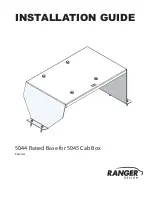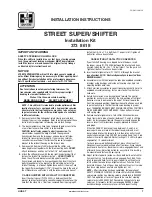
Winter tires
Do not drive with a tire tread depth of less than
0.16 in/4 mm, as such tires are less suitable for
winter driving conditions.
Minimum tread depth
Distributed over the tire circumference are the
tire manufacturer’s wear indicators with a
height of at least 0.06 in/1.6 mm, which serve
as an indicator of tire tread wear.
The positions of the wear indicators are
marked on the tire sidewall with TWI, Tread
Wear Indicator.
Irrespective of the wear indicators, observe the
statutory regulations on the minimum tread
depth.
Tire damage
General information
Check your tires regularly for damage, foreign
bodies lodged in the tread, and tread wear.
Driving over rough or damaged road surfaces,
as well as debris, curbs and other obstacles
can cause serious damage to wheels, tires and
suspension parts. This is more likely to occur
with low-profile tires, which provide less cush-
ioning between the wheel and the road. Be
careful to avoid road hazards and reduce your
speed, especially if your vehicle is equipped
with low-profile tires.
Indications of tire damage or other vehicle mal-
functions:
▷
Unusual vibrations.
▷
Unusual tire or running noises.
▷
Unusual handling such as a strong ten-
dency to pull to the left or right.
▷
Uneven wear pattern, e.g., increased wear
in the area of the tire shoulder.
Damage can be caused by the following situa-
tions, for instance:
▷
Driving over curbs.
▷
Road damage.
▷
Tire pressure too low.
▷
Vehicle overloading.
▷
Incorrect tire storage.
Safety information
Warning
Damaged tires can lose tire inflation pres-
sure, which can lead to loss of vehicle control.
There is a risk of accident. If tire damage is
suspected while driving, immediately reduce
speed and stop. Have wheels and tires
checked. For this purpose, drive carefully to
the nearest dealer’s service center or another
qualified service center or repair shop. Have
vehicle towed or transported as needed. Do
not repair damaged tires, but have them re-
placed.
Warning
Tires can become damaged by driving over
obstacles, e.g., curbs or road damage, at high
speed. Larger wheels have a smaller tire
cross-section. The smaller the tire cross-sec-
tion, the higher the risk of tire damage. There
may be a risk of accidents and risk of dam-
age to property. If possible, avoid driving over
objects or road conditions that may damage
tires, or drive over them slowly and carefully.
Seite 300
MOBILITY
Wheels and tires
300
Online Edition for Part no. 01405A546C7 - II/22
Summary of Contents for i4 GRAN COUPE 2022
Page 1: ...OWNER S MANUAL BMW i4 GRAN COUPE Content A Z Online Edition for Part no 01405A546C7 II 22...
Page 2: ......
Page 19: ...Owner s Manual media NOTES 19 Online Edition for Part no 01405A546C7 II 22...
Page 271: ...Cargo area CONTROLS 271 Online Edition for Part no 01405A546C7 II 22...
Page 281: ...Increasing range DRIVING TIPS 281 Online Edition for Part no 01405A546C7 II 22...
Page 347: ...Appendix REFERENCE 347 Online Edition for Part no 01405A546C7 II 22...
Page 363: ...X xDrive 198 Everything from A to Z REFERENCE 363 Online Edition for Part no 01405A546C7 II 22...
Page 364: ...BL5A546C7005 01405A546C7 ue Online Edition for Part no 01405A546C7 II 22...
Page 365: ......
Page 366: ......
















































